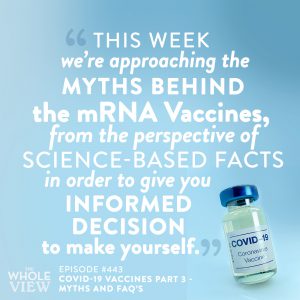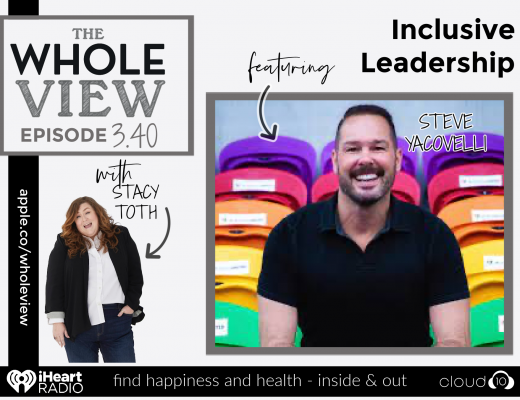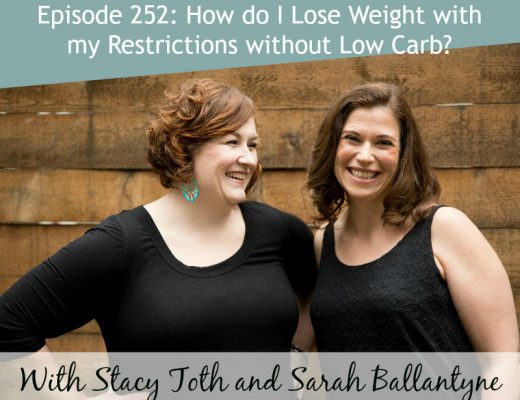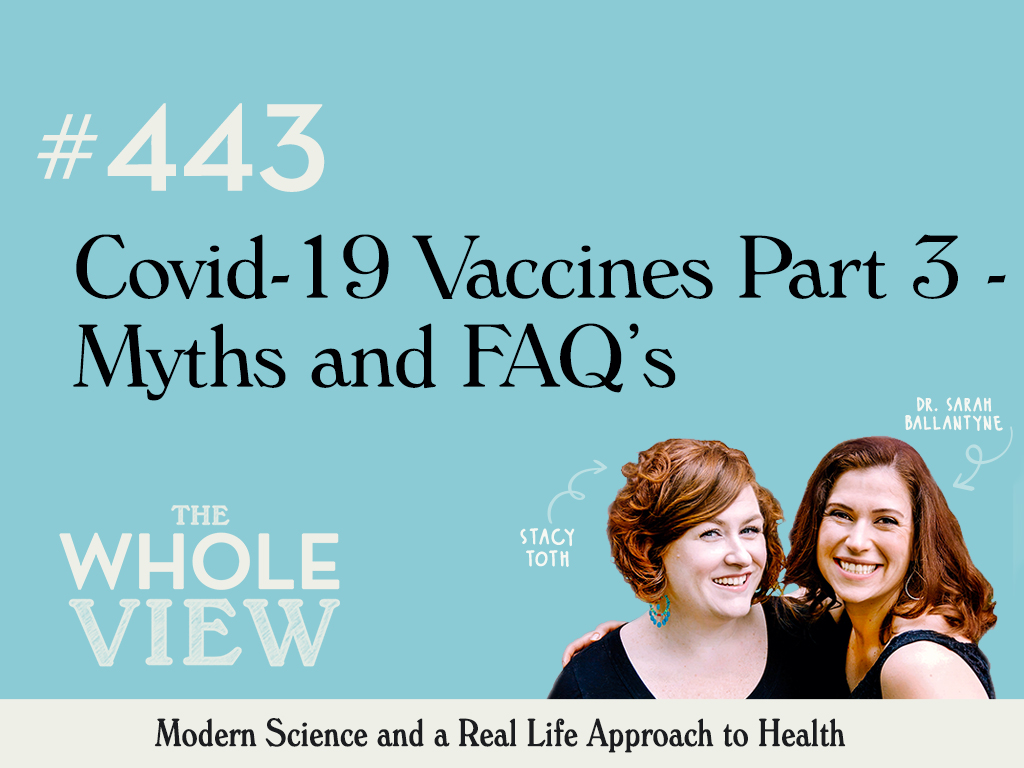
Welcome to episode 443 of The Whole View! This week, Stacy and Sarah answer questions from listeners regarding the Covid-19 Vaccines Myths in hopes of clarifying any unclear areas from the previous two shows.
If you enjoy the show, please review it on iTunes!
The Whole View, Episode 443: Covid-19 Vaccines Part 3 – Myths and FAQ’s
Welcome back to episode 443 of the Whole View. (0:27)
Stacy explains that this is part 3 of the Covid Vaccine Shows: you can find Part 1 here and Part 2 here.
She thanks every listener for all their positivity and understanding. The point of these shows is to give the information needed to make an informed decision for yourself.
She also extends a bit thanks to Sarah, who has logged a ridiculous amount of hours doing extensive research to arm listeners with all the information she can.
Sarah explains that this show may be on the long side. But she hopes to answer some questions followers have and dispel or shed light on common myths around these vaccines.
Stacy adds that this show is all about the facts. Nothing they say is meant to be opinion based not backed up by science.
She also reminds listeners that she and Sarah are not medical professionals. They are not qualified to give medical advice on whether you should get the vaccine or not.
The best practice is to consult your primary care physician.
Stacy hopes that all this information can help listeners make an informed decision they are happy with.
Listener FAQ: Covid-19 Vaccines Myths
Sarah goes through several positive comments left by viewers, expressing their appreciation of the science included in previous shows and arming them with as much research as Sarah did. (7:45)
She takes a moment to emphasize that the FDA reports and all of the peer-reviewed papers on these clinical trials are full public access.
They will be included in these show notes so listeners can go to the source for more information and formulate their own opinions based on the science.
Stacy jokes that will be a theme of the show today: science and information.
The first question Sarah takes comes from a listener on Patreon.
Sarah reminds listeners that Patreon is the best platform to reach them and was the first place they went when pulling questions.
If you’ve not joined the Patreon family, she invites you to for bonus content and extra episodes!
Herd Immunity
The first question Sarah takes is about herd immunity and why wearing masks is still encouraged after vaccination. (13:30)
Sarah explains the there are multiple positive outcomes that we hope to get from the vaccines:
- Prevent disability and death
- Ease the burden on the healthcare system to ensure patients get the necessary attention
- Ease the burden on the economy so we can open schools, etc. back up
- Achieve herd immunity, so we don’t have to live with covid forever
She adds that even if we can achieve the first three without the fourth, that’s a huge win, and we don’t necessarily need herd immunity for the vaccine to be a success.
The benefit of herd immunity (why it’s ideal) is it limits the spread to pockets that more easily die out because they don’t have as many places to go.
Sarah explains that we don’t have all the information yet to determine how long immunity from vaccination will last.
There is still a lot of tests needing to be done to accurately calculate those numbers.
Sarah does say that the preliminary data (early outlooks) looks promising for reducing asymptomatic cases.
That’s why it’s still important to wear a mask in the meantime. We need to keep the disease spread as low as possible to give researchers time to figure out what the future will look like for herd immunity.
Sarah adds that this is actually very exciting early data. She explains data for the newer Oxford/Astrazeneca vaccine maybe 59 percent effective at stopping asymptomatic infection.
However, Sarah emphasizes that we definitely need more data before saying people with the vaccine can go without masks and social distancing.
Long-Term Effects of Asymptomatic Cases
Sarah jumps to another listener’s question on whether those asymptomatic or mild cases carry the risks of long covid or other long-term damage. (22:32)
Sarah recaps long-covid, which she and Stacy talked about long covid and tissue damage on our previous covid shows.
She does a quick recap on what long-term effects are known to be associated with Covid-19 infections, such as the tissue damage seen in long-Covid.
There’s no evidence from the clinical trials about possible long-term damage comparable to mild cases.
Myocarditis is shown to occur in between 15-35% of covid patients and even 15% in young college athletes with mild or asymptomatic cases.
Sarah reminds listeners that not everyone who gets covid will suffer permanent heart damage. She does agree it’s a concern but doesn’t want to scare anyone.
While this hasn’t been methodically studied yet, the early data points to the only likely long-term effect of getting vaccinated being immunity to covid-19.
Stacy adds that many people involved in the clinical trials actually reached out to her and Sarah.
They spoke of the attentiveness they experienced and how closely monitored they were.
Stacy thanks those followers for sharing their crucial experiences!
Stacy also shares her experiences with long-covid and does not wish it on anyone.
Both vaccines were thoroughly tested for anything and everything that could possibly go wrong.
Pregnant Women
Another listener asks if the Covid-19 vaccines are safe for pregnant women and children yet, due to it being super unclear in the media. (37:20)
Pregnant women were excluded from trials, but some became pregnant after enrolling. Those women were followed closely for monitoring.
There is very limited human testing in this area. However, WHO recently said pregnant women can get the covid vaccine due to the few cases. No issues with pregnancy were detected in animal studies of vaccines.
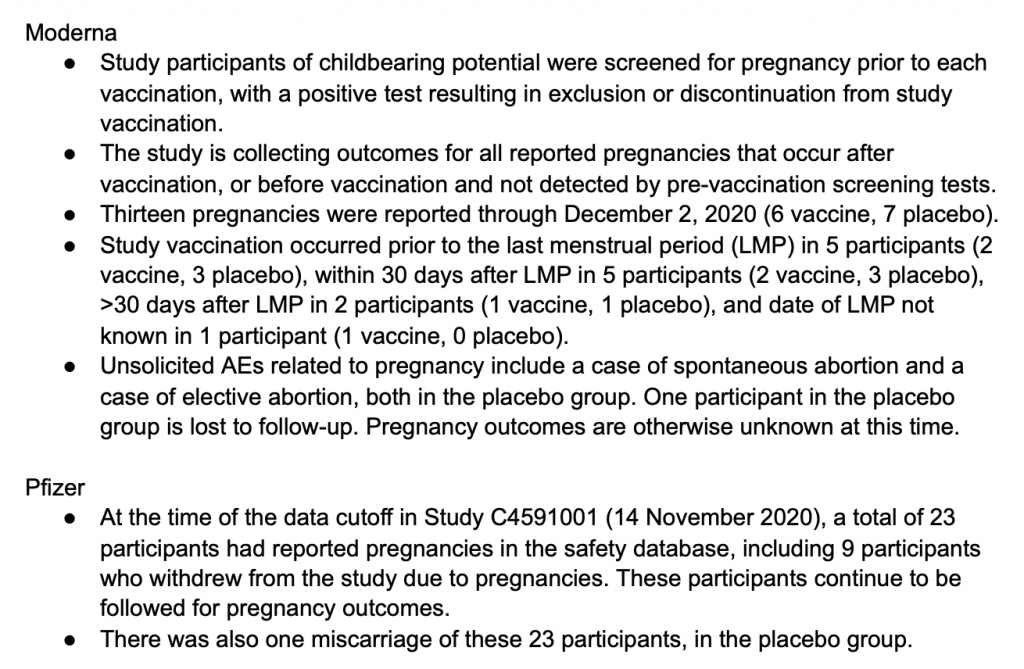
Sarah mentions that pregnant women are considered high-risk, and that’s definitely something to keep in mind when deciding if vaccination is right for you.
Pregnant women are overall 3-3.5x more likely to require ventilation. And 70% more likely to die from covid than their age and risk factor-matched controls.
It’s even worse for AMA, pregnant women aged 35–44 years with COVID-19:
- nearly four times as likely to require invasive ventilation
- twice as likely to die than were non-pregnant women of the same age
Sarah recommends reviewing this article for more information.
She also mentions that despite being considered “high-risk,” the absolute risk is still low.
This is why even though data is preliminary for vaccines, some organizations recommend it.
CDC recommends pregnant women have a conversation with their doctors.
Another listener asks for recommendations for breastfeeding. Sarah says that nothing is saying that breastfeeding could be problematic. But it does warrant a conversation with your doctor.
Stacy adds that what’s in your blood is different from what’s in your milk.
Children
Pfizer already tested in 16-18-year-olds. It showed good safety, efficacy consistent with adult data and already has EUA to 16+. (40:41)
Pfizer is currently testing in 12-15-year-olds, fully enrolled, and expect data in the summer.
Moderna is currently testing 12 to 18-year-olds, still enrolling, and hoping to have approval in time for 2021/2022 school year.
Sarah actually enrolled her daughter because they are having issues filling slots for those studies. She and her family are waiting to find out if she’ll be in the trial.
Then they’ll move into younger and younger children (6-11 then 1-5).
They go slow, start with a lower dose to be extra cautious, and so these trials take longer.
Moderna doesn’t expect to have data in children 1 to 11 until well into 2022, so we just have to wait for now.
Young Women and Future Pregnancy
Sarah addresses a question from a listener regarding information she heard about the possibility of hurting the lining of their placenta when they want to have children. What is the premise of this? (49:50)
She explains that this is one of those myths based on a kernel of truth but took on a life of its own on the internet.
Sarah goes in-depth about the spike protein and how antibodies affect them. She adds that the same thing has a chance of happening in natural infection.
And even then, the numbers are very slim.
Sarah summarizes that it’s not impossible but highly improbable, and we have no examples to point to.
Autoimmune Diseases In More Detail
Sarah covers another question on whether a vaccine could cause something with no history of autoimmune conditions to trigger a response for a lifelong autoimmune condition. (53:02)
She goes in-depth, looking at numerous case reports indicating that vaccines could potentially worsen autoimmune disease activity and increase measurable autoantibody levels.
This is most likely attributed to the adjuvants in vaccines.
However, several large-scale prospective studies indicate no link between vaccines and autoimmune disease or autoantibody formation.
Sarah explores several different studies that looked at this research topic and breaks down what the data shows.
In fact, early data shows vaccines could potentially reduce autoimmune diseases by preventing environmental triggers for it.
However, this still needs to be studied in a lot more detail before we can say for sure.
Sarah adds that for the covid mRNA vaccines, clinical trials included autoimmune sufferers (even those on DMARDS) and tracked autoimmune disease as possible adverse events.
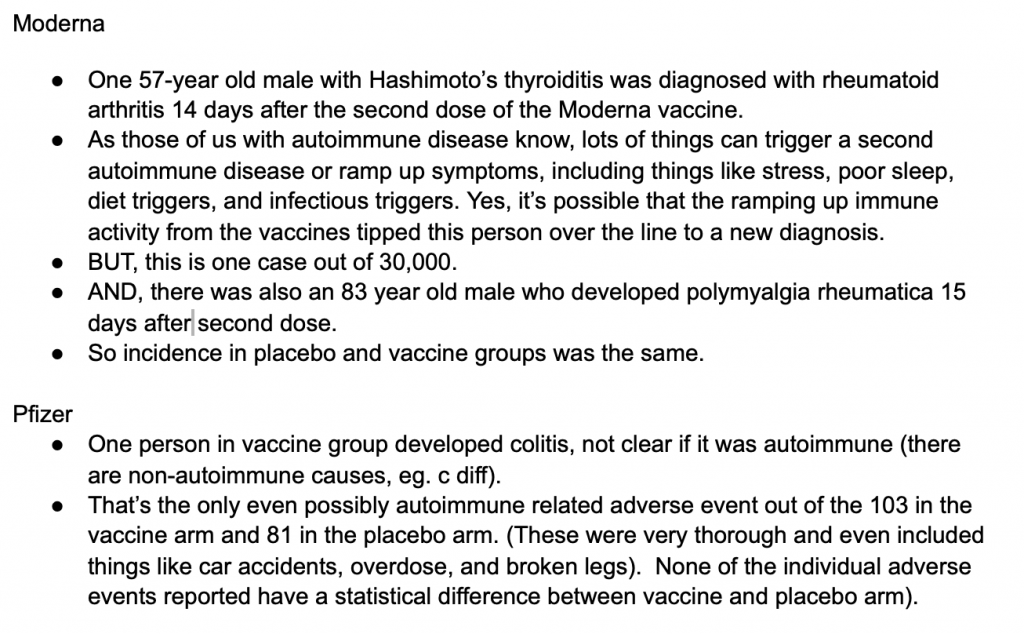
Sarah revisits vaccine injury, which they discussed in the Covid first show, and the timeframe.
She adds EAU will transition to full regulatory approval once there are 6 months of follow-up data and we’re actually nearly there. Clinical trial participants will also be followed for 24 months.
Final Thoughts
Stacy reflects on how much it blows her mind the comparison between the study group and the placebo. (1:07:14)
When out of 30,000 people, you have one person in the study group and one placebo group both have an immune response, it sounds way better to Stacy than if that’s the same one person was extrapolated from the data, and the rest left out.
Sarah reiterates that this is the point of these shows: to provide listeners with the big picture and all the data. Not facts that may or may not have been taken out of context.
Stacy mentions that she and Sarah didn’t want to skimp on any information. For this reason, decided to cut this two-hour show into two parts.
Join us again next week for more Covid-19 vaccine myths dispelled! And be sure to pop over and join Sarah and Stacy on Patreon.
